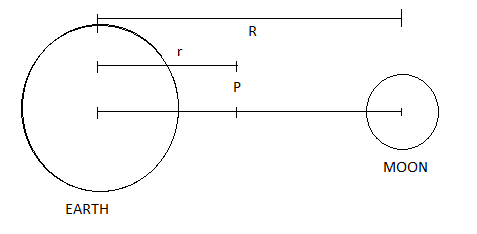
The distance between earth and moon is about $3.8 \times {10^5}\,km$ . At what point(s) will the net gravitational force of the earth-moon system be zero? (Given mass of earth is 81 times the moon’s mass)
A) $38 \times {10^9}m$
B) $38 \times {10^7}m$
C) $8 \times {10^7}m$
D) $3.8 \times {10^7}m$
Answer
568.8k+ views
Hint:The net gravitational force of the earth-moon system will be zero when the gravitational force of the earth will be balanced by that of the moon. This means that the gravitational potential of the earth will be equal to that of the moon for this particular point.
Formula Used:
Gravitational force on a body of mass $m$ due to another body of mass $M$ separated by a distance $r$ is given by $\dfrac{{GMm}}{{{r^2}}}$ where, $G$ is the universal gravitational constant with value $6.67 \times {10^{ - 11}}N{m^2}k{g^{ - 2}}$
Complete Step by Step Solution:
Consider a point P between Earth and Moon at a distance of $r$ kilometres from the Earth. Let the distance between Earth and Moon be $R$ . Therefore, $R = 3.8 \times {10^5}\,km$ (given in question)

Let the mass of Earth be $M$ and mass of moon be $m$ and the mass of object P be $m'$
Therefore, $M = 81m$ (given in question)
Gravitational force on object P due to Earth $ = \dfrac{{GMm'}}{{{r^2}}} = \dfrac{{G \times 81m \times m'}}{{{r^2}}}$ (because of above equation)
Gravitational force on object P due to Moon $ = \dfrac{{Gmm'}}{{{{(R - r)}^2}}} = \dfrac{{Gmm'}}{{{{[(3.8 \times {{10}^5}) - r]}^2}}}$
Now, the net gravitational force experienced by the object P at a distance $r$ kilometres from the Earth must be zero. So, the force on it due to the Moon and the Earth must be equal.
Therefore, $\dfrac{{G \times 81m \times m'}}{{{r^2}}} = \dfrac{{G \times m \times m'}}{{{{[(3.8 \times {{10}^5}) - r]}^2}}}$
After cancelling out similar variables, we are left with
\[\dfrac{{81}}{{{r^2}}} = \dfrac{1}{{{{[(3.8 \times {{10}^5}) - r]}^2}}}\]
Take the square root of the entire equation. We get
\[\dfrac{9}{r} = \dfrac{1}{{(3.8 \times {{10}^5}) - r}}\]
$ \Rightarrow 9[(3.8 \times {10^5}) - r] = r$
$ \Rightarrow 9(3.8 \times {10^5}) - 9r = r$
On simplifying, we get $10r = 9(3.8 \times {10^5})$
Or, $r = 3.42 \times {10^5}km = 34.2 \times {10^7}m$
We see that this answer is not given in any of the options so the answer closest to it will be the correct answer to the question (taking in account the physical errors while calculation)
Hence, option B is the correct answer.
Note:Do not confuse $G$ with $g$ . The first one is the universal gravitational constant. Its value is the same throughout the universe. Its value is $6.67 \times {10^{ - 11}}N{m^2}k{g^{ - 2}}$ . The latter is acceleration due to gravity. Its value on earth is $9.8m{s^{ - 2}}$
Formula Used:
Gravitational force on a body of mass $m$ due to another body of mass $M$ separated by a distance $r$ is given by $\dfrac{{GMm}}{{{r^2}}}$ where, $G$ is the universal gravitational constant with value $6.67 \times {10^{ - 11}}N{m^2}k{g^{ - 2}}$
Complete Step by Step Solution:
Consider a point P between Earth and Moon at a distance of $r$ kilometres from the Earth. Let the distance between Earth and Moon be $R$ . Therefore, $R = 3.8 \times {10^5}\,km$ (given in question)

Let the mass of Earth be $M$ and mass of moon be $m$ and the mass of object P be $m'$
Therefore, $M = 81m$ (given in question)
Gravitational force on object P due to Earth $ = \dfrac{{GMm'}}{{{r^2}}} = \dfrac{{G \times 81m \times m'}}{{{r^2}}}$ (because of above equation)
Gravitational force on object P due to Moon $ = \dfrac{{Gmm'}}{{{{(R - r)}^2}}} = \dfrac{{Gmm'}}{{{{[(3.8 \times {{10}^5}) - r]}^2}}}$
Now, the net gravitational force experienced by the object P at a distance $r$ kilometres from the Earth must be zero. So, the force on it due to the Moon and the Earth must be equal.
Therefore, $\dfrac{{G \times 81m \times m'}}{{{r^2}}} = \dfrac{{G \times m \times m'}}{{{{[(3.8 \times {{10}^5}) - r]}^2}}}$
After cancelling out similar variables, we are left with
\[\dfrac{{81}}{{{r^2}}} = \dfrac{1}{{{{[(3.8 \times {{10}^5}) - r]}^2}}}\]
Take the square root of the entire equation. We get
\[\dfrac{9}{r} = \dfrac{1}{{(3.8 \times {{10}^5}) - r}}\]
$ \Rightarrow 9[(3.8 \times {10^5}) - r] = r$
$ \Rightarrow 9(3.8 \times {10^5}) - 9r = r$
On simplifying, we get $10r = 9(3.8 \times {10^5})$
Or, $r = 3.42 \times {10^5}km = 34.2 \times {10^7}m$
We see that this answer is not given in any of the options so the answer closest to it will be the correct answer to the question (taking in account the physical errors while calculation)
Hence, option B is the correct answer.
Note:Do not confuse $G$ with $g$ . The first one is the universal gravitational constant. Its value is the same throughout the universe. Its value is $6.67 \times {10^{ - 11}}N{m^2}k{g^{ - 2}}$ . The latter is acceleration due to gravity. Its value on earth is $9.8m{s^{ - 2}}$
Recently Updated Pages
Master Class 11 Computer Science: Engaging Questions & Answers for Success

Master Class 11 Business Studies: Engaging Questions & Answers for Success

Master Class 11 Economics: Engaging Questions & Answers for Success

Master Class 11 English: Engaging Questions & Answers for Success

Master Class 11 Maths: Engaging Questions & Answers for Success

Master Class 11 Biology: Engaging Questions & Answers for Success

Trending doubts
One Metric ton is equal to kg A 10000 B 1000 C 100 class 11 physics CBSE

There are 720 permutations of the digits 1 2 3 4 5 class 11 maths CBSE

Discuss the various forms of bacteria class 11 biology CBSE

Draw a diagram of a plant cell and label at least eight class 11 biology CBSE

State the laws of reflection of light

Explain zero factorial class 11 maths CBSE




